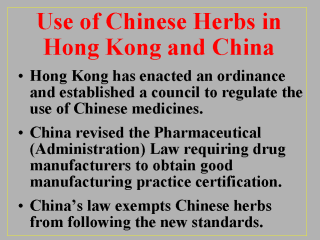| front |1 |2 |3 |4 |5 |6 |7 |8 |9 |10 |11 |12 |13 |14 |15 |16 |17 |18 |19 |20 |21 |22 |23 |review |
 |
Hong Kong, which
is now a Special Administrative Region (SAR) of China, is considered a forerunner in Asia
in the regulation of traditional Chinese medicine (TCM) and the use of Chinese herbs.
According to Dr. Margaret Chan (2001), Director of Health of the HKSAR government, “Hong
Kong has made inroads by establishing a sound regulatory framework to regulate the use of
Chinese medicines and to register the (TCM) practitioners, which will in turn promote the
future development of Chinese medicine in Hong Kong.” Hong Kong’s Chinese Medicine Ordinance was enacted in July 1999, which established the Chinese Medicine Council as an independent statutory body with the responsibilities of devising and implementing regulatory measures for the practice of this traditional form of medicine. In China, under the revised Pharmaceutical (Administration) Law effective December 2001, drug manufacturers are now required to obtain good manufacturing practice certification. As summarized by Beach (2001), this new law aims “to standardize the pharmaceutical drug procurement and distribution system, to further encourage open market competitiveness in the pharmaceutical industry, and to combat drug counterfeiting.” Nonetheless, it was the earlier version of this pharmaceutical law, which became effective 1985, that represented the initial attempt at regulation of Chinese herbal medicines (CHM) in China. The new version continues to exempt many, if not all, CHM from following the new production standards. |